Table of contents
What is coconut oil?
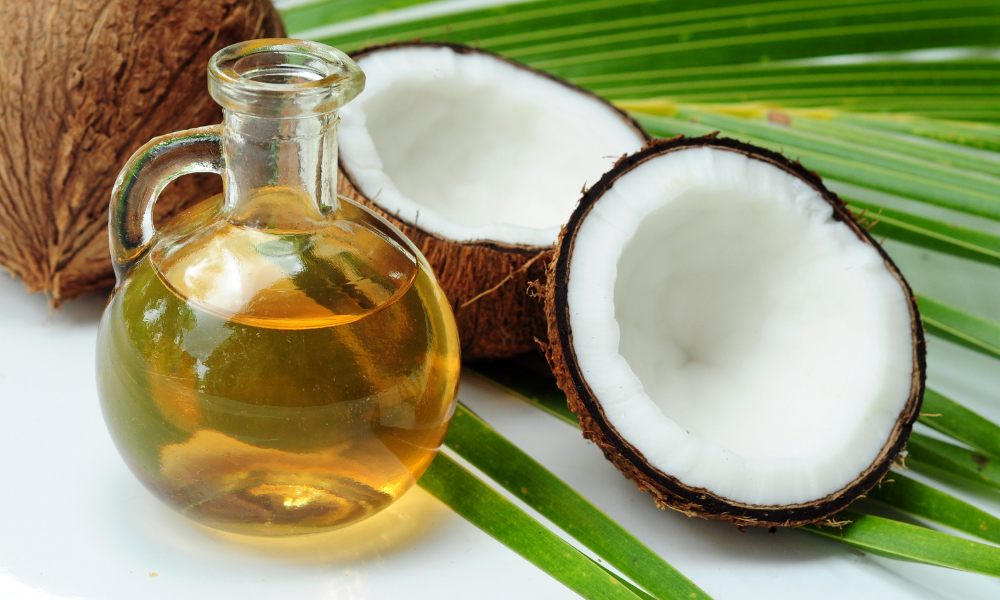
Coconut oil can be denominated as a fat extracted from the coconut, being it fresh or dry. When this fat is obtained from the fresh fruit it is called refined coconut oil and when it is taken from the dry coconut it is characterized as extravirgin.
Composed of fats, saturated and unsaturated fatty acids, coconut oil is a vegetable oil and its use is a somewhat controversial subject among experts, especially regarding its overuse.
Well known for having several functions, coconut oil is used in many ways, ranging from food to use as moisturizing masks for hair, for example.
What can not be denied, no doubt, is the popularity that this little darling has gained in recent times. But it is worth noting that, regardless of how you will use it is important to consult the opinion of a specialist in the area to make its use in a safe way. Discover in this article, all about coconut oil.
Aspects of coconut oil
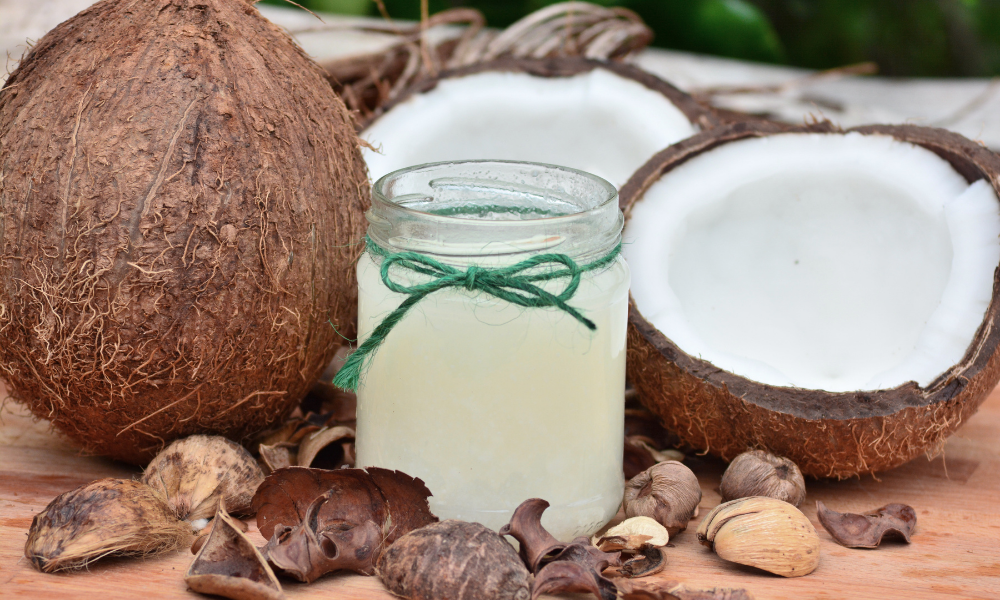
Known for being a natural fat rich in nutrients and antioxidants, the use of coconut oil has become popular for its many uses. However, we should always pay attention to the type of coconut oil before using it.
We can find coconut oil in different aspects: virgin coconut oil, dry coconut oil and hydrogenated coconut oil. Read on to learn more about each one!
Virgin coconut oil
Being the best known, virgin coconut oil is the most beneficial because it is not subjected to high temperatures and does not lose nutrients due to the fact that it is not processed and refined.
However, it should not be confused with extra-virgin coconut oil. Virgin coconut oil is extracted from the brown part of the fruit, between the shell and the pulp, while extra-virgin is taken only from the white part of the coconut.
Dry coconut oil
The oil taken from the dried coconut is called extravirgin, taking this name due to the extraction method. This oil is taken from the dried fruit without the film that separates the white part from the shell and is cold pressed.
Its color is totally transparent when it is in liquid state and white when it is in solid state. Due to the way it is removed from the fruit, dry coconut oil usually has a slightly higher price compared to other oils.
Hydrogenated coconut oil
Hydrogenated coconut oil is no longer known to be such a healthy product, as it is combined with hydrogen to transform into a pasty or solid state.
The hydrogenated fat in excess is harmful to health bringing some imbalances in the body as increased insulin in the blood and heart problems, for example. Thus, it is interesting to prefer virgin or extra virgin coconut oil for consumption.
The versatility of coconut oil
Coconut oil is the vegetable oil with the most functionality there is, being used from cosmetics to food, although its intake is still a bit controversial.
In the world of beauty, coconut oil is used for hair moisturizing, skin hydration and to reduce the sensitivity of the teeth. Finally, in food its usefulness is to replace mineral oils, since they are not healthy.
Contrariness of coconut oil
Although coconut oil is known for its numerous benefits, some experts ponder when it comes to attributing so much credibility to the vegetable oil due to the lack of scientific evidence regarding the treatment and prevention of some diseases.
Currently there are only studies on the antiviral, antibacterial, antifungal and immunomodulatory functions of coconut oil, and there is no clinical evidence that it attenuates or protects neurodegenerative diseases. In other words, these are alternatives that are still under experimentation.
Benefits of coconut oil
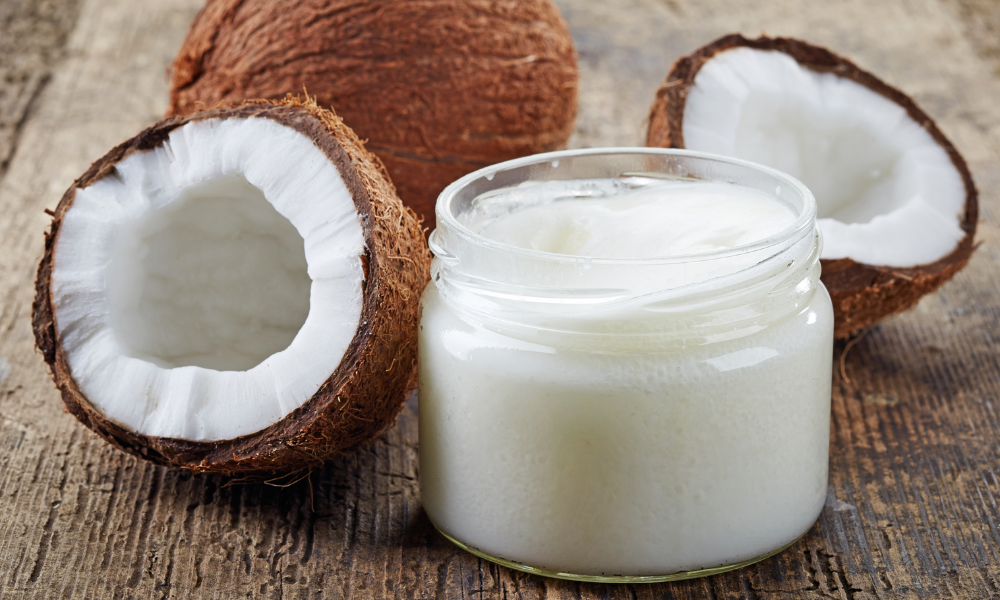
Coconut oil brings several benefits to its user, ranging from culinary and cosmetic, extending even as an aid in diseases that cause dementia such as Alzheimer's, for example.
Known for its versatility, coconut oil is used for different purposes. Below you check out its benefits in hair care, anti-aging skin, improving fat levels and more!
Hair treatment
Due to the nutrients contained in coconut oil, it becomes a great ally at the time of moisturizing the hair. However, care should be taken not to apply it to the hair root, because it can end up clogging the pores of the scalp thus causing possible hair loss.
Coconut oil can be used alone or added to some hair product. Remembering that its use provides hydration to the wires, that is, its recommendation is for dry, opaque and brittle hair and should not be used every day.
Anti-aging effect on the skin
Coconut oil can also be used to combat skin aging, as it is composed of a high concentration of antioxidants, responsible for protecting cells from free radicals.
On the face, coconut oil can be used both alone as an auxiliary with the chosen cosmetic with the purpose of moisturizing the skin, always taking care not to use in excess, because due to be a greasy product can clog the pores with its use in excess.
Improves fat levels
There are studies that prove that replacing mineral oils and hydrogenated vegetable fats with coconut oil improves total cholesterol levels thus preventing possible heart disease.
And yet it was confirmed a low incidence of high cholesterol, stroke, hypertension and in the weakening of the heart muscles in people who adhered to diets with large amounts of coconut consumption.
Treats gingivitis and plaque formation on teeth
Gingivitis is a disease that causes inflammation of the gums, leaving them swollen, sensitive and in some cases bleeding. Its cause probably stems from inadequate oral cleaning.
Bacterial plaque, on the other hand, is characterized by being a sticky film that has no color, formed by remains of food and bacteria. If it is not removed it can cause the formation of tartar, gingivitis and caries.
It was found through some studies that coconut oil is a great helper at the time of making our oral hygiene, because in addition to help treat gingivitis also helps prevent the formation of plaque on the teeth.
Improves diabetes
Diabetes is a disease caused by hyperglycemia, that is, by the increase of glucose in the blood. It can happen by the incorrect functioning of insulin, the hormone responsible for controlling glucose in the blood.
According to some studies, the antioxidant properties of virgin or extra virgin coconut oil help to fight and improve diabetes. Its role in this case is to contribute to the reduction of blood glucose levels by improving glucose tolerance.
Contribution to weight loss
Due to the fact that it is a great antioxidant, coconut oil is an aid when it comes to losing weight, as it is responsible for increasing energy expenditure and oxidation of fats.
However, one should be attentive to the form of consumption, because as we well know everything in excess can be harmful and even being a completely natural fat, coconut oil is not ruled out of bringing some harm due to excessive use.
Prevents Alzheimer's disease
Alzheimer's is a neurodegenerative disease that gradually causes memory loss and cognitive deterioration. Its possible causes include genetics, accumulation of proteins in the brain, decrease of the neurotransmitter acetylcholine, herpes virus, among others.
Although this subject is a little controversial, some studies point coconut oil as an ally to prevent Alzheimer's. This is because coconut oil is rich in fatty acids that when absorbed by the liver will be transformed into ketones, which are responsible for alternative energy sources for the brain.
Helps to burn more energy and regulate hunger
If you want to lose weight, coconut oil can be a good ally. Because it is composed of medium-chain triglycerides, it can make you have increased energy expenditure, compared to other fats.
Another point to highlight is its role in being an appetite suppressant. This is due to the way its fatty acids are metabolized, thus being an excellent helper when it comes to losing weight.
Treats dry, scaly and rough skin
Known as xerosis, dry, flaky and rough skin bothers many people, especially women. This is because the natural protective barrier of the skin is not working properly causing the skin to peel.
Coconut oil, known for its moisturizing property becomes a great ally in combating xerosis. Remembering that to ensure satisfactory results the ideal is to make its use with constancy.
Can kill viruses, bacteria and fungi
Among its many uses, coconut oil is also known for its antibacterial, antifungal and antiviral capabilities. When digested, coconut oil forms monolaurin, a lauric acid that can kill viruses, fungi and bacteria.
However, there are only clinical studies that prove this fact, being very important to remember that we should not dismiss the possibility of seeking medical advice and help depending on the case.
How to use coconut oil
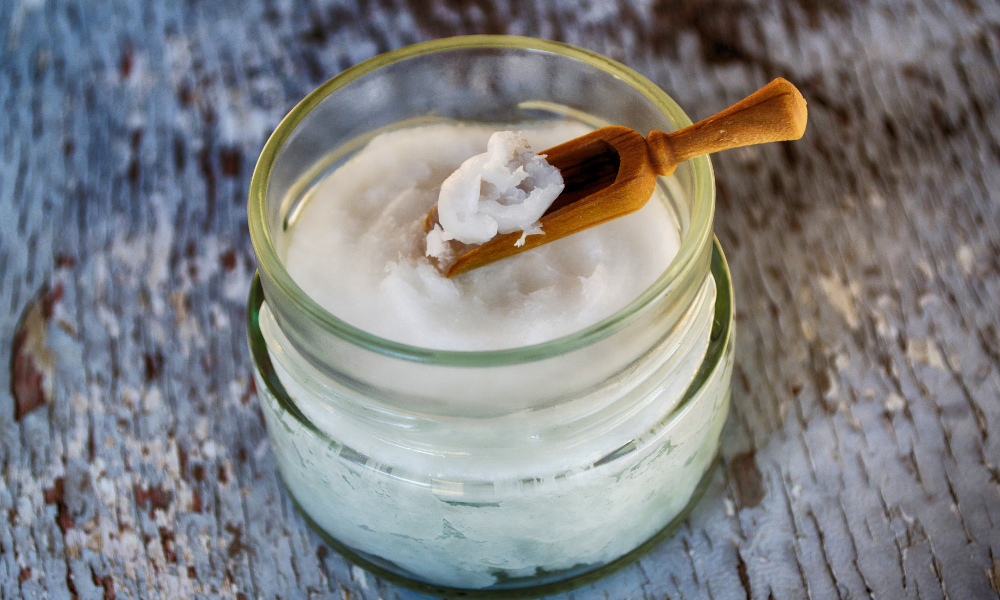
Being a vegetable oil rich in nutrients, coconut oil has several ways to use and observe them is important when consuming this natural fat.
Taking into account the multifunction of coconut oil, knowing how to use it is essential to not make any mistakes. Read on to learn how to use coconut oil in food, to lose weight, in oral hygiene and more!
Coconut oil in food
At the time of cooking, coconut oil also has several functions. It can be used to replace the fat you use for frying, pasta and cakes, be it butter or mineral oil.
It is important to note that the daily consumption of coconut oil should not exceed one tablespoon per day. However, extra virgin coconut oil is not recommended for use in frying, as it burns at lower temperatures.
Coconut oil for weight loss
Although not yet scientifically proven, some studies point coconut oil as an ally in losing weight. This is because it has medium chain triglycerides, which helps not accumulate fat in fat tissue, as happens with other types of fats when ingested.
However, caution is recommended when consuming coconut oil. Ingesting high amounts may no longer be beneficial to the body due to its calories, and its consumption can not exceed one tablespoon a day.
Coconut oil in oral hygiene
One more use for coconut oil is in the fight against gingivitis and dental plaque. You can adopt its daily use and prove the benefits.
Because it is not well known, this function of coconut oil is still not widely used. However, rinsing with it in the morning helps to eliminate bacteria and reduce gingivitis, taking care not to ingest it in this procedure, because it will be composed of oral bacteria.
Coconut oil on hair
One of the forms of use for which coconut oil has become known in recent times is for its use in hair. Due to its great moisturizing capacity, this vegetable oil can be used alone, added to hair masks or conditioners.
The hair masks with coconut oil are intended to moisturize and nourish dry, brittle and lifeless hair. For this, you should apply the mixture or only coconut oil in the length of the strands, taking care not to pass on the root of the hair.
The ideal at the time of application of coconut oil, is that the hair is wet, washed only with shampoo. After applying the length of the threads, it is interesting to let it act fifteen to thirty minutes and finish with a conditioner normally.
Coconut oil on the skin
A very common way to use coconut oil is to apply it to the skin, either alone or as a carrier for some essential oil. Due to its antioxidant and nourishing properties, coconut oil aids in moisturizing the skin, whether the face, lips or body in general.
It can be used directly on the face to leave it acting overnight, as a lip protector or even as makeup remover. For this, you just need to apply a little coconut oil on a cotton pad and slide it over the part you want to remove the makeup.
How to make coconut oil at home
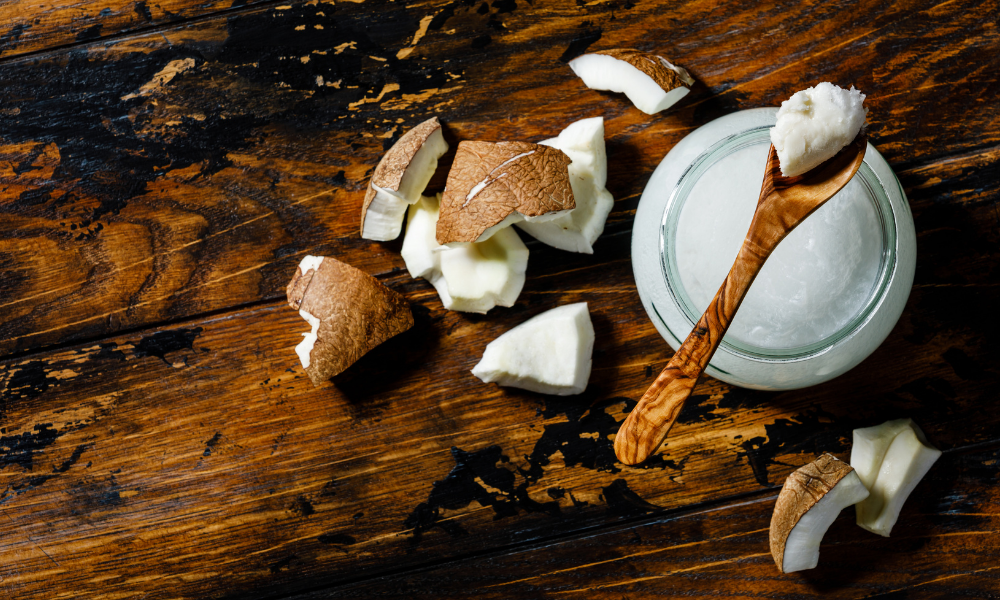
Coconut oil helps in the process of weight loss, to regulate diabetes, cholesterol and even immunity. Besides other utilities such as moisturizing the skin and hair, helping to combat gingivitis and plaque, for example.
Now let's get to the coolest part! It is possible to make coconut oil at home, being an easy and practical alternative for those who can't find it ready to buy. All you need is two ingredients, a container and a blender.
Ingredients
To prepare coconut oil at home you will need only two ingredients.You will need:
- 3 cups of coconut water;
- 2 brown shell coconuts peeled and cut into small pieces.
Directions
To make the homemade coconut oil, whisk the coconut water along with its chopped pieces. Then strain the liquid into a plastic bottle with the help of a clean cloth.
Place the bottle with the liquid in a dark room and let it sit for forty-eight hours. After that time, move the bottle to a cool place with natural lighting and leave it for another six hours. Then, place the container in the refrigerator for another six hours.
After these steps, when you remove the bottle from the refrigerator you will notice that the liquid has become solid. To remove it from the bottle it is necessary to cut it at the part where the water and oil will be separated, and only the oil should be used. It is recommended to transfer it to a container with a lid and store it in a cool place.
Is coconut oil really beneficial?
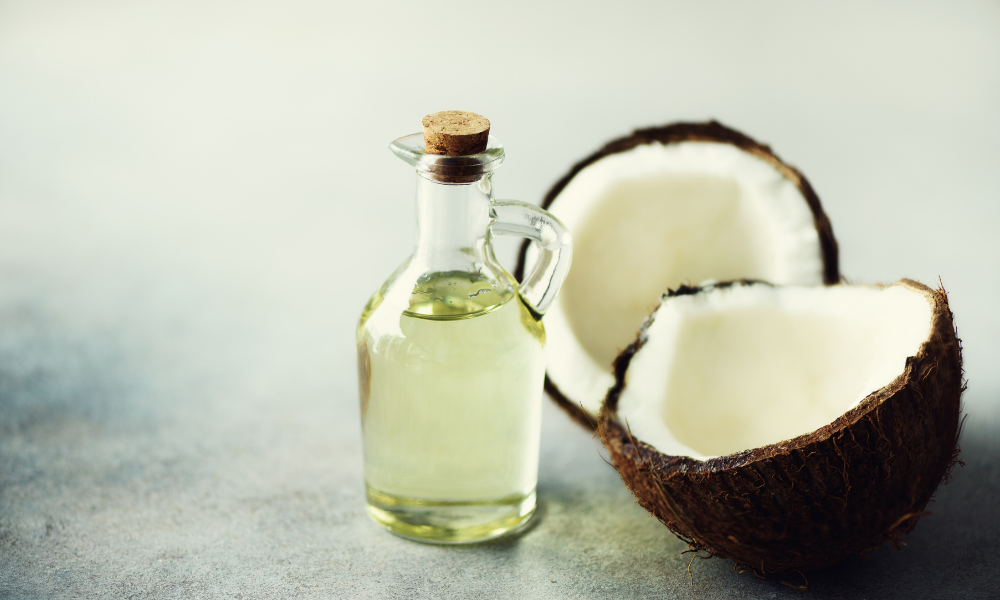
In recent times, coconut oil has gained a great popularity. Undoubtedly, this vegetable oil brings numerous benefits to its users that range from the proper use in food to as a natural and powerful cosmetic helper.
Among the numerous benefits of coconut oil we can highlight the most common, including its ability to hydration due to its high amount of antioxidants and nutrients, strengthening the immune system, increased satiety and an aid in weight loss.
What should be taken into consideration is the way of using it. As much as it is a natural fat, coconut oil should be consumed in small amounts, not exceeding one tablespoon a day, although its intake is still controversial.
Another point to note is to observe the variety of coconut oil. You should avoid consuming it in hydrogenated form, because this fat is not very good for your health. Prefer coconut oils in their virgin or extra virgin version, depending on how you are going to use them.

